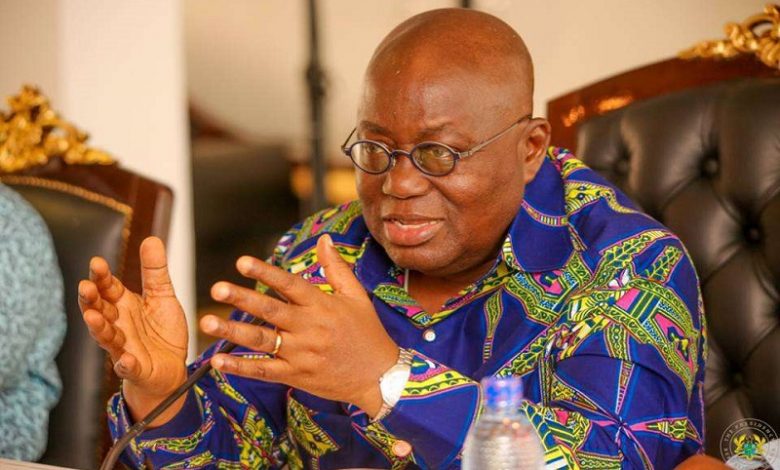Akufo-Addo names government transition team

President Nana Addo Dankwa Akufo-Addo has announced a list of persons who are members of the government’s Transition Team, which will supervise the smooth transition of executive authority to the next administration in accordance with the Presidential (Transition) Act, 2012 (Act 845).
The team include:
Hon. Akosua Frema Osei-Opare – Chief of Staff (Team Co-Chairperson)
Godfred Yeboah Dame – Attorney-General
Hon. Osei Kyei-Mensah-Bonsu – Minister responsible for Presidential Affairs
Hon. Dr. Mohammed Amin Adam – Minister responsible for Finance
Hon. Henry Quartey – Minister responsible for the Interior
Hon. Dominic Nitiwul – Minister responsible for Defence
Hon. Shirley Ayorkor Botchwey – Minister responsible for Foreign Affairs
Hon. Martin Adjei-Mensah Korsah – Minister responsible for Local Government
Hon. Albert Kan Dapaah – Minister responsible for National Security
The team further include:
Dr. Evans Aggrey-Darkoh – Head of Civil Service
Dr. Nana Ato Arthur – Head of Local Government Service
Ambassador Mercy Debrah-Karikari – Secretary to the Cabinet
Mr. Edward Asomani – National Security Coordinator
On Wednesday, December 11, 2024, President Akufo-Addo and President-elect John Dramani Mahama will meet to officially launch the Transition Team. Mahama will be the Co-Chairpersons of the team. It has been decided that Hon. Akosua Frema Osei-Opare will serve as Co-Chairperson while the President is away.
Additionally, the current Speaker of Parliament, Rt. Hon. Alban Bagbin, has been named by the President to the Advisory Council, along with former Speaker of Parliament, Rt. Hon. Prof. Aaron Mike Oquaye.
As the teams collaborate to preserve governance stability, the president-elect also revealed the members of his side of the Transition Team earlier today, guaranteeing balanced participation.
In order to improve Ghana’s democratic credentials, President Akufo-Addo restated his commitment to a seamless transition process.
The Transition Team’s job is to provide a smooth transition in order to maintain continuity and promote national cohesion.
Delete Akufo-Addo’s name from list of ex-presidents if he becomes one – Adam Bonaa
Security analyst Dr. Adam Bonaa has called for the name of the incumbent President, Nana Akufo-Addo, to be removed from the list of ex-presidents when he exits office on January 7, 2025.
Speaking on TV3’s Ghana Decides 2024 programme , monitored by Ghanaweb, Dr. Bonaa stated that the conduct of the President while in office does not merit inclusion in the prestigious list of Ghana’s ex-presidents.
“If it is possible, let us expunge Nana Addo’s name from the list of ex-presidents if he becomes one. Listen, what Nana Addo has done to this country… I am old enough to have witnessed many of the coups that took place in this country, but we never experienced some of the things that happened under Nana Addo. And yet, we had takeovers here and there.
“This means we have come far, Nana was instructing chiefs to get up and greet him, doing all manner of things, and you ask yourself, ‘Where did we go wrong?’ What has taken place… a lot of my friends in the NPP are so disappointed. It is because of Nana Addo’s bad, irresponsible, reckless, and looting government that we find ourselves where we are,” he added.
President Akufo-Addo assumed office in 2017 after winning the 2016 presidential election in the first round, having previously contested in the 2008 and 2012 presidential elections.
He will exit office on January 7, 2025, just before the newly elected President, John Mahama, is sworn in.
Ghana Armed Forces is headless at the moment, no effective leadership – Adam Bonaa
Security analyst Adam Bonaa has delivered a damning verdict on the Ghana Armed Forces, asserting that the institution currently lacks effective leadership.
According to him, events during the just-ended December 7, 2024, general elections have revealed significant issues within the Ghana Armed Forces, an institution traditionally revered for its discipline.
Speaking on TV3’s Ghana Decides 2024 programme, monitored by GhanaWeb, Dr. Bonaa explained why he had urged citizens not to leave polling stations after casting their ballots.
“…People didn’t understand why I said citizens should not go home and that they should confront them [the military personnel] with their bare hands. They [the Armed Forces] had issued a directive stating they would not be on the frontlines of election security. You don’t make such a statement and then have rogue senior officers directing personnel to these locations.
“I told you the military is currently headless. It has no effective leadership. I said it, and I stand by it… it doesn’t. Oppong Peprah, the Chief of Defence Staff (CDS), has become an ineffective leader. In the military, you have commanders in charge of the sea, air, and land forces, with him at the top. Ultimately, everything rests on his shoulders,” Dr. Bonaa asserted.
The Ghana Armed Forces (GAF), on December 6, a day before the general elections, confirmed the deployment of its personnel to designated locations nationwide to support the Ghana Police Service (GPS) in ensuring the peaceful conduct of the 2024 Presidential and Parliamentary elections.
In a statement, GAF reassured the public that the movement of military personnel in various localities was part of its collaboration with the police to maintain law and order during the electoral process.
The statement urged citizens not to be alarmed by the presence of the military in their communities.
GAF clarified that “no military personnel would be stationed at any polling stations.” Instead, their role was to provide standby support, with the primary responsibility for election security resting with the Police Service. Military deployment, it said, would only occur upon a request by the police to address specific situations requiring reinforcement.
“This collaborative approach ensures that the elections proceed smoothly and peacefully while maintaining law and order,” the statement read.
Despite this assurance, there were instances where soldiers were deployed to polling stations, leading to physical altercations with civilians. In some cases, civilians attempted to disarm the soldiers during the brawls.



